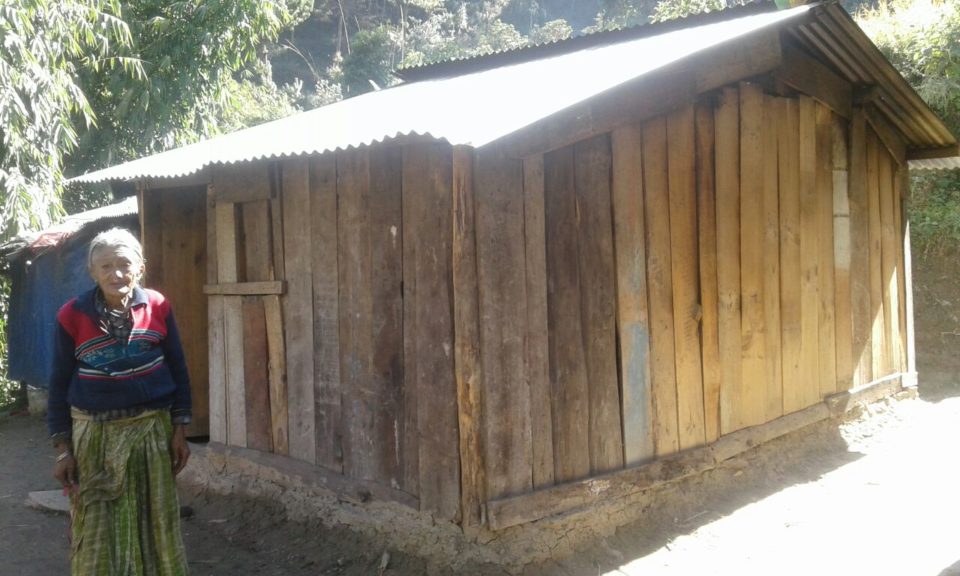 Stories
Stories
December 7, 2016 • 3 min read
"Your support has helped us be warm in the difficult weather and helped us rebuild our home."

"Reducing winter concerns for families in Northern Nepal"
As a three year old in 1934, Ganga Maya Basnet has faint memories of the 8.0 magnitude earthquake that struck Nepal. Eight decades later she witnessed a similar earthquake. She was forced to move under a cowshed for shelter after the 7.6 magnitude earthquake destroyed her home. She had been living with her 50 year old daughter, the fifth among her six children. Her house was in Lisey village, Ward number 3 of Those VDC, Ramechhap district. After the earthquake she moved in with her eldest 62 year old daughter in Gobretar village in Those VDC Ward number 7.
Traditionally, in Nepali society, ageing parents have to be looked after by a son. However, Ganga Maya’s 60 year old son lives in the USA and does not support the family in any way. Her son’s son was next in line to take care of her, as per the traditional norms, but he refuses to fulfil this role in his house in Kathmandu.
In her younger days, Ganga Maya raised her children singlehandedly when her husband left her for another woman and settled in the Terai region of southern Nepal. She didn’t hear from him again but found out a few years ago that he passed away.
Ganga Maya moved into an emergency shelter with two of her daughters and her grandchild. It was made of tarps supported by the Government, but it was damp and cold and did not protect them from bad winds, rain or the cold during the night. Four women in a single shelter made life difficult for them.”The government had only provided us tarps. GOAL provided us with warm clothes when we were cold and shelter materials when we were living in a miserable situation. Your support has helped us be warm in the difficult weather and helped us rebuild or home. With your support, I presume we won’t need to buy any warm clothes or any other thing to keep us warm for 2-3 years. Thank you for reaching to us.”
Ramechhap is a hilly district located approximately 90 km east from the capital city, Kathmandu in Nepal. The Shelter Cluster Assessment of May 2015 showed that 39,916 houses in the district were destroyed from April 2015 Earthquake which pushed 86% of the families to live in temporary shelters. Recent assessments in northern Ramechhap had estimated that 75% of temporary structures in the area are in decrepit condition, as the materials used for temporary shelters had weathered out from months of battering by natural forces. Given the poor condition of the shelters built, 80% households report to feel unsafe in the shelters that they were living in.
GOAL reached Ganga Maya and her family during the previous 2015-2016 ECHO-funded winterization support project, providing them with tarps for better insulation and blankets in the peak of winter in December, 2015. Upon the recommendation from a local community meeting and following GOAL’s assessment, they were found to be in dire need of shelter support. Under GOAL’s 2016-2017 European Commission – Civil Protection & Humanitarian Aid Operations – ECHO-funded shelter programme, Mrs Maya’s family were provided with CGI sheets and other fixing materials in September, 2016. While the shelter was being built, GOAL technical monitors also visited and provided technical advices on safety measures to the construction workers and family members, most of which were incorporated.
The additional cash support from GOAL, as well as the government grant support for Earthquake affected families, enabled them to pay for additional materials and labour for the construction. The support has helped them to stay protected from bad weather in a relatively comfortable shelter.
Ganga Maya has been getting the old age pension which is the sole source of income for them. Her daughter Bhima Devi, being solely responsible for taking care of her elderly mother, her sister and daughter, both with mental disorder, is extremely happy with the support. It has reduced her financial worries. Bhima Devi hopes to get further support in livelihood, preferably training on livestock farming.
